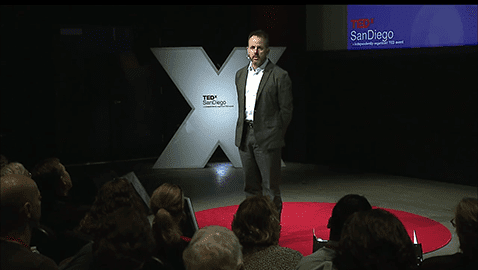UCSD professor Benjamin Bratton criticizes TED talks and explains why he believes they’re ineffective
When a TEDx organizer offered Benjamin H. Bratton, associate professor of visual arts at UCSD, the opportunity to speak at the TEDxSanDiego event, he responded, “The only TED talk I would do is one about why I don’t like TED Talks.”
Bratton’s talk, titled “What’s Wrong with TED Talks?” addressed what he sees as TED’s oversimplification of ideas and shallow, quick-fix solutions to complex problems. He believes that while TED is devised to inform the public of innovative technology and design, it has turned into conferences filled with emptiness, where no meaning or information is truly gathered.
“Instead of [a speaker’s] interest and desire being channeled into something that may shift terms of the conversation, [TED] has turned into this empty experience,” Bratton said in an interview with the UCSD Guardian.
Bratton explained that since TED is a very popular part of technological media, it has become a kind of template for technology in which people must talk about brilliant ideas in a “TED Talks” way.
“TED has become such a dominant format that it has taken up way too much of [people’s] conversations,” Bratton said. “Saying something bad about TED is like saying something bad about kittens or ice cream — I mean, who doesn’t like it?”
Bratton said TED doesn’t stand up to its name.
“TED, of course, stands for Technology, Entertainment, Design, and I’ll talk a bit about all three,” he said during his TED talk. “But I think TED actually stands for ‘middle-brow mega-church infotainment.’”
Bratton explained that his talk intended to expose the increasingly trivial context that he believes TED has come to support and to challenge the general conception that all of its talks are meaningful and inspiring.
“[I wanted] to basically, in a way, pop the bubble of TED,” Bratton said. “[From] watching over a period of time, the way in which [speakers] would talk about and communicate these issues of technology and design [has] gotten dumber and dumber and shallower and shallower. It [has] just diverted into this placebo.”
Bratton’s talk has earned him praise and attention — he’s been interviewed and featured in several popular news outlets. An article about his talk published in Britain’s the Guardian rose to the most read piece on the site after it was released on Dec. 30, 2013. The video of his talk received over 100,000 views, and his talk received 20 “like” votes to every dislike, according to Bratton.
“The reaction to it was much bigger and stronger than I anticipated,” Bratton said. “[I received] hundreds of emails saying, ‘Thanks for doing this,’ ‘I’m glad somebody finally said this’ [or] ‘I appreciated that you had the courage to stand up and say this.’ I really touched a nerve that was kind of waiting there to be touched.”
Although the support he’s gotten demonstrates that his points of criticism resonate with many, Bratton still hopes that those who disagree with him will recognize the condescending way in which he believes TED conveys ideas and technology.
Despite his outspoken opposition to the current trend of TED Talks, Bratton expressed indifference regarding the future of TED.
“To be honest, I don’t care what happens to TED Talks — it wouldn’t bother me in the least,” Bratton said. “[But], if TED turned into something that is serious and useful and treated people like they’re in the conversation, that would be better.”












